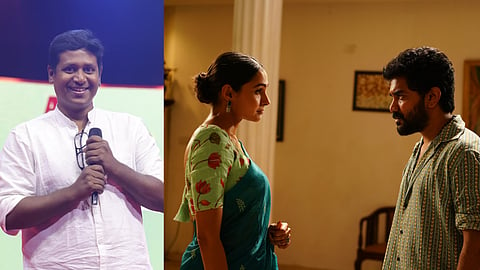

In between theatre-hopping to gather reactions, director Vikarnan Ashok sat down for a candid chat to make sense of the wildest weekend of his life, following the release of his debut film, Mask. Ask him about the most surprising theatre reaction and he replies with a chuckle, “The most unexpected reaction was my own reaction because for everyone it was a regular Friday, but for me it was “The” Friday and it was surreal watching my film with the audience.”
Vikarnan then shares the insights he gathered from theatre visits, “The 'naanum Mohan thaan' moment, the supermarket scene leading towards the interval, scenes with Archana ma’am, and the climax scene involving Charle sir drew the most positive reactions, which was exactly what I expected.” Meanwhile, Vikarnan is also not shying away from the criticisms. “I heard the criticisms on sound mixing, about the voices and music overlapping. However, everybody who worked on this film are good technicians, so I would like to take full responsibility for this issue," says the director, who had earlier revealed that the scam mentioned in the film is something he experienced years ago. “I wanted to represent the anger of the middle class. I asked myself the question, ‘What if an angry middle-class person was also smart enough to hit back and get away with it?”
Interestingly, the first draft of Mask completely revolved around the heist. It was director Vetri Maaran who urged Vikarnan to delve more into the emotional side of the anger without disturbing the story. Elaborating, Vikarnan says, “Both Velu (Kavin) and Bhumi (Andrea) are not good people, but what happens when one develops a conscience. And that's what decided the protagonist and the antagonist." Vikarnan points out that his foray into the film industry taught him more than just cinema. "I’m just a director, not a filmmaker. Filmmakers are people like Selvaraghavan sir and Vetri Maaran sir. I don’t think I can use a tag like “A film by...” yet," says a candid Vikarnan, who shares that the biggest lesson of them all was how to navigate the film sets. “Filmmaking is 50 per cent damage control, 40 per cent balancing egos, and the rest about protecting your vision. Being a director is mostly about handling the chaos on the set, dealing with unexpected issues, sudden location changes or prop delays, you have to be prepared for all of that and not become overwhelmed.”
In a year that has been quite a landmark one for debutant filmmakers, Vikarnan adds his two cents about the people who'd be following suit. “I want that person to be very arrogant about what they want. I don’t want them to be an arrogant person but I want them to be arrogant about their writing and be completely open to crushing criticisms, but they have to make the final call. They have to be ready to evolve, but also not let the egos slide in. I don’t want this person to think about three-act structures or audience reaction. I want them to write what they want, and the rest will follow suit,” says a hopeful yet pragmatic Vikarnan. As for dealing with harsh criticisms, the filmmaker, or let's say, director points to the recent controversy surrounding Dude director Keerthiswaran’s response to a disappointed audience. “I don’t think what Keerthiswaran did was wrong. I don’t think the girl’s intentions were wrong either, but the choice of words matters. You can give a strong criticism with a civilised choice of words. If that had happened, I don’t think Keerthiswaran would have responded like that. Constructive criticism is always welcome,” concludes Vikarnan, before setting off to another theatre visit.